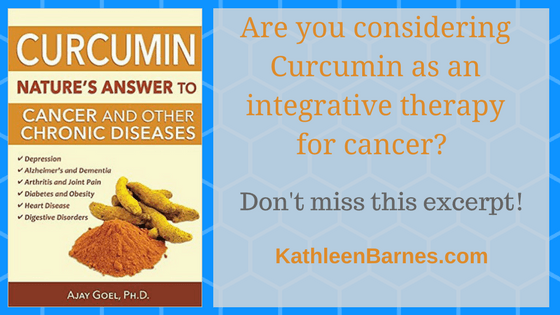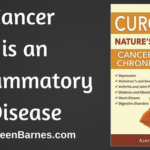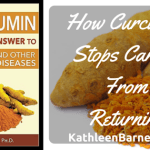This is an excerpt from a book I recently edited and published, Curcumin: Nature’s Answer to Cancer and Other Chronic Diseases by Ajay Goel, Ph.D. This book offers cutting edge information on prevention and treatment of cancer by an acclaimed cancer researcher at Baylor University.
So—you or someone you love has been diagnosed with cancer.
Your brain is whirling. You are unable to assimilate anything. You have a million questions, but you’re unable to voice any of them.
That’s the first step, the day you get the news. The C-word. It’s devastating.
Next you ask, “Why me?” ”Why my husband, my mother, my child?”
Then in a nanosecond, your friends rush in to “help.” Many of them have cancer stories to tell you–each one more dire than the last. Others want you to take coffee enemas, go to a clinic in Mexico, or adopt a macrobiotic diet. Everyone has a wonder “cure.”
Your confusion grows.
Your doctors want to do chemotherapy and radiation, possibly surgery. You’ve seen the devastating effects of all of these, but you are terrified that you’ll make the wrong choice, the fatal choice.
Doctors disparage “alternative” therapies as quackery. Friends and alternative practitioners urge you to try herbs, machines, and avoid chemo and radiation at all costs.
You are facing a potentially life-threatening illness; you’re frightened and overwhelmed, overloaded with “information,” with no tools to determine what’s true and what’s not. You have no idea where to turn.
Ask, “Is it really cancer?”
In recent years, we have seen vastly increased numbers of cancer diagnoses. With the advances in technology, we now have the ability to diagnose cancers much earlier. We also can find cells that may be precancerous or look abnormal. Yes, we have better diagnostic tools. But that doesn’t necessarily mean we need to engage in aggressive cancer treatment when there are abnormal cells that may or may not even be cancer. In many cases, the treatment (surgery, chemotherapy and radiation have become standard for most types of cancer) is far more destructive to the human body than the cancer itself would ever be.
Most of us by now have heard of men diagnosed with prostate cancers that are so slow growing that doctors are telling men in their 60s or older, that something else will kill them before cancer ever does. That’s a somewhat new and enlightened position for conventional medicine, but it’s only a drop in the bucket.
But here’s the point: Most of us may have some type of abnormal cells if we look carefully enough. Does this mean we all have cancer? Of course not! However, the discovery of any abnormal cells may actually be a red flag, an impetus that we need to make the lifestyle changes that will keep these cells from becoming a disease.
This notion brings into focus all of the epigenetic and lifestyle changes that cause gene disruptions that can lead to cancer.
Look to science
If you’ve been diagnosed with cancer and you’re satisfied with the answers from your doctor, you probably won’t be surprised that I recommend you look at the science behind the recommendation, both on the “alternative” side and the conventional medical treatment.
I don’t really like to call it “alternative.” That’s old terminology. Today, natural therapies are more often called complementary or integrative therapies. That makes sense to me.
I would like to offer you another way of thinking about a cancer diagnosis: If you choose, you can effectively combine natural remedies and conventional treatment.
In the past 20 years, dietary supplements have become part of the Western culture. More than half of the U.S. population regularly uses dietary supplements. Supplement and herbal remedy sales alone in 2010 totaled $5.2 billion, according to a 2013 study published in the journal, Integrative Cancer Therapies.
Cancer patients are particularly likely to use supplements, with as many as 87% of breast cancer patients using some type of dietary supplement. In the late ‘90s, about 20% of cancer patients used some kind of supplements designed to slow their cancers. Today, that figure is closer to 60%. Why? Because they’ve seen the benefits when family members and friends have used them and there is science behind many of them.
Doctors say “No”
It’s interesting to note that many cancer patients do not report their supplement use to their doctors, perhaps for fear of being ridiculed or encountering negativity. Some doctors reflexively say “no” to complementary therapies when their patients ask about them, often a result of ignorance about the broad scope of scientific evidence that supports their value.
Many doctors will tell you that these supplements have no scientific validation. I’m here to tell you that in many instances that may not be true and may simply be a smokescreen for the doctor’s lack of knowledge.
I don’t intend to categorize the medical profession here. But you are very likely to find that many doctors subscribe to a pretty rigid way of thinking about what works and what doesn’t work.
A good doctor will do some research on supplements that a patient wants to use and endorse the ones that have scientific validation and discourage the use of those that might be ineffective or even harmful. I strongly believe that a relationship of trust between a physician and a patient is an essential part of the healing process.
For example, a search of the National Library of Medicine’s database of published scientific studies on curcumin returns 8,237 results as of this writing and adding cancer to the search, you’ll find 3,121 results, the earliest in 1983.
This is a substantial body of science that proves curcumin’s power, much of it as a cancer preventive and treatment. I know. I’ve conducted several of those studies myself.
There is undeniable evidence that curcumin should be one of our most valuable weapons in our arsenal against cancer. It may even be the most effective one. You can take that information to your doctor with confidence.
You’ll note that we have included a brief synopsis of the key scientific points on this topic in Chapter 13. I encourage you to copy those pages and give them to your doctor. While doctors may not have time to read an entire book, please impress upon your medical professionals the importance of reading and assimilating these few key pages. It could quite literally save your life and the lives of many others.







